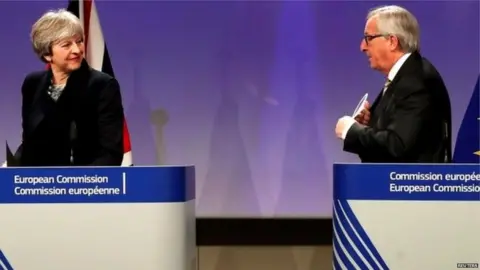Brexit: 'Ball is now in London's court', says Irish PM
The Irish prime minister Leo Varadkar, has told the Dáil (Irish parliament) that "the ball is now in London's court" after Brexit talks between the UK and the EU broke up on Monday.
He said that he accepted that Prime Minister Theresa May was negotiating in good faith but had difficulties.
Mr Varadkar said the talks were between a sovereign state, the United Kingdom, and the 27 sovereign states of the EU.
"They don't involve one political party to the exclusion of others", he added.
No agreement has been reached between the UK the EU after a DUP backlash against proposals for the Irish border.
The Irish government has been seeking guarantees from the UK that there would be no customs checks on the border with Northern Ireland after Brexit and movements of goods and people would remain seamless.
However speaking at Westminster on Tuesday, tDUP deputy leader Nigel Dodds blamed the Irish government for the failure in the Brexit negotiations, accusing it of behaving in a "reckless and dangerous way".
'Time and Space'
 Reuters
ReutersMr Varardkar stressed that Ireland was keen to move onto phase two of Brexit negotiations on future trading relationship between the UK and the EU to guarantee, among other things, that airlines can continue to fly.
Speaking earlier on Tuesday, Irish Foreign Minister Simon Coveney said the Irish government wanted to give Theresa May time and space to manage "difficult political issues".
He said the Irish government would work with the British government on issues around the text of the agreement.
But he said they would not reverse out of an agreement they felt was secured.
Mr Coveney, who is also the Republic's deputy prime minister, said the DUP should be listened to, but that one political party could not decide what was acceptable just because it held the balance of power at Westminster.
On Monday, Mr Varadkar said he was "surprised and disappointed" a deal had not been reached.
He said the Republic of Ireland could not go into a second phase of Brexit talks without "firm guarantees that there will not be a hard border in Ireland".
Mr Varadkar said the UK had agreed a text that met Irish concerns.
However, he was then later told that the British government was not in a position to conclude "what was agreed".
'Guns to people's heads'
Speaking on Tuesday, his Fine Gael colleague, MEP Brian Hayes, said of the DUP's position: "Putting guns to people's heads is never a sensible thing to do in politics - it's certainly not sensible, centre-ground politics.
"What's important here is that we get back to the text, and if there are some words that can help people, fine, but they cannot be a diminution of what we have."
Sinn Féin deputy leader Mary Lou MacDonald said the DUP had been on the wrong side of the Brexit argument from the beginning and appealed for them to "step back" from their position.
"I would appeal to the DUP to understand this is not a case of 'orange versus green'. This is all of us on this island, protecting ourselves and protecting each other," she said.
Meanwhile, former UK Foreign Secretary Malcolm Rifkind said it appeared there was a press report "which suggested something different to the agreement, and that's why the DUP took fright".
Speaking to RTE's Morning Ireland, Mr Rifkind said a journalist reported on Monday that regulations and directives would be imposed in Northern Ireland "relating to the border that would not exist elsewhere in the United Kingdom - as if that was a 100% obligation and that was never what the document said".
Mr Rifkind said he understood it may have been in an earlier draft and that it was removed.
He described Mr Coveney's comments on Tuesday as "very constructive".
